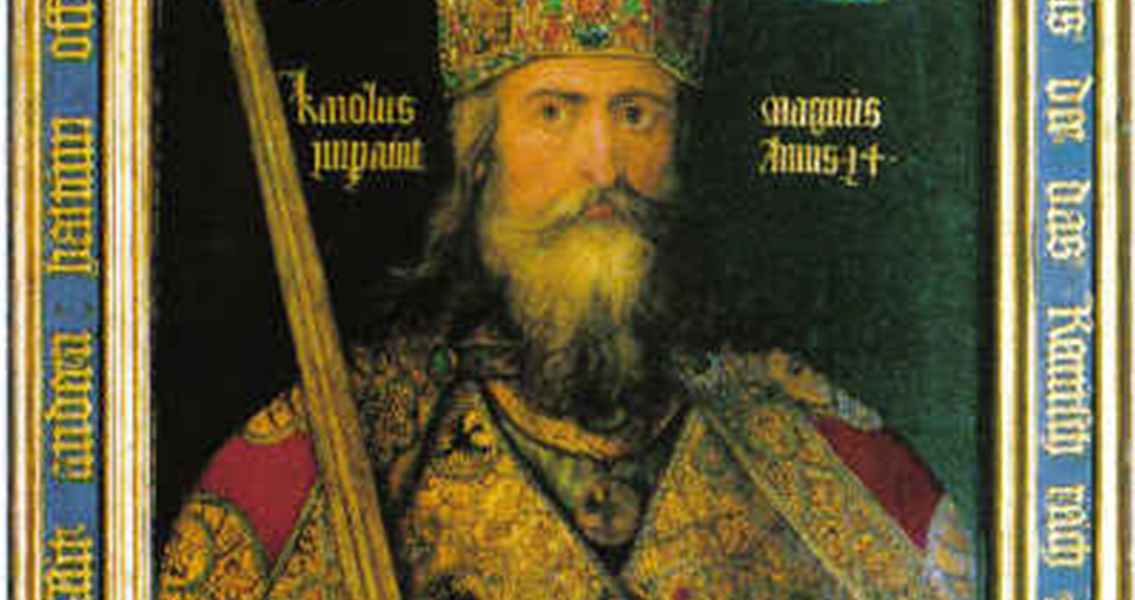<![CDATA[On the 4th December 771 CE Charlemagne became King of the Franks following the death of his brother, Carolman. Described by some as the 'Father of Europe', the reign of Charlemagne was a pivotal time in the history of the continent, when the Catholic Church was established as the dominant religious institution and the foundations of Medieval society were laid. Little is known about Charlemagne's childhood, although historians suggest a date of birth sometime between 742 and 748 CE. His birthplace is also open to debate, but the most likely locations are either Liege in modern-day Belgium or Aachen in modern-day Germany. It seems he recieved a strong grounding in social, military and political activities through participating in his father, Pepin the Short's, court. For the early years of his son's lives, Pepin served the Merovingian King as a Mayor of the Palace, an important role that afforded him significant power throughout the Frankish Kingdom. In 751 he deposed the last Merovingian King, Childeric III. He had sought papal approval before doing so, setting the basis for an alliance that would develop significantly throughout the rest of Pepin's life, and come to define much of Charlemagne's reign. Pepin's death in 768 saw the Frankish Kingdom, which included parts of modern day France, Belgium, Luxembourg, Holland and Germany, divided between his two sons. Carolman's sudden death, with no clear successor, placed the whole of Frankish territory under Charlemagne's control. Charlemagne's life was characterised by two ambitions; to unite all Germanic peoples under one ruler and to spread Christianity. The vigour with which he pursued these aims meant that much of his reign was spent involved in military campaigns. By 800 CE Charlemagne had expanded his empire significantly, taking Northern Italy from the Lombards, Saxony from the Saxons, and Spain from the Moors. He'd also subdued the Avars in the basin of the River Danube and conquered Bohemia, providing his Empire with an important shield to its East. The conquests of Saxon territories in particular were accompanied by a forced conversion to Christianity for the new subjects. Charlemagne ultimately declared that anyone who refused to be baptised and follow Christian traditions would be put to death. The ruthlessness with which these aims were carried out was revealed in the Massacre of Verden, when Charlemagne is reported to have ordered the slaughter of around 4,500 Saxons. It shouldn't be assumed that Charlemagne's rule was purely one of blood and conversion, however. It is associated with the Carolingian Renaissance, a period in the supposed Dark Ages that saw a renewed focus on scholarship and culture. Administrative reforms throughout his vast empire saw the establishment of key representatives to oversee each region, and an annual general assembly at his court in Aachen. The most enduring effects of the Carolingian Renaissance came in language and numbers. Charlemagne oversaw the creation of a standardised system of weights, measures and customs dues, which would go on to greatly simplify trade throughout his Empire. He was also a driving force behind the creation of the Carolingian miniscule, a form of writing that would become the basis for many modern European alphabets. His status as emperor was awarded in 800 CE, following years of dedication to the church and papacy. Throughout his reign he had donated lands and wealth to the church, contributing to the enormous political, social and economic influence it would enjoy throughout the Middle Ages. The coronation in 800 was a consequence of Charlemagne coming to the pope's aid and suppressing a rebellion in Italy. The title of emperor added legitimacy to his reign, especially in Italy, and gave Charlemagne an authority and prestige similar to the former Western Emperors of Rome. Charlemagne died in 814, leaving control of his empire to his son, Louis the Pious. Over the following decades the empire was divided up amongst his heirs, before eventually dissolving. The enormous territory Charlemagne won may not have survived for long after his death, but the cultural legacy of his reign continues today.]]>
Charlemagne Becomes King of the Franks
